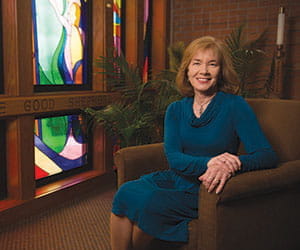
Photo credit: Johnny Sundby Photography
As she stood before a group of women in Nakuru, Kenya, preparing to deliver a talk on forgiveness, Dr. Christy Heacock ’17 looked out and saw not just an eager audience but also a new horizon.
A lifelong high school and college educator, Heacock was pursuing a new challenge. Although she loved teaching and had experience in a range of subjects, she craved something different, something inspiring.
“It was a leap,” she says. “I gave up a stable and comfortable career because I wanted to expand, to learn something new and valuable.”
She chose to pursue her PhD in Psychology at Walden, eventually researching and writing her dissertation on forgiveness as experienced by people with different sacred beliefs.
Heacock interviewed people of diverse religious backgrounds—from the well-known religions of Christianity, Islam, and Buddhism to lesser-known faiths such as the Red Road and Sacred Pipe of the Lakota. Ultimately, what she learned was that forgiveness is universal. It can be a healing agent no matter your location or your spiritual roots.
But the proof was in the audience in front of her at a women’s center more than 8,000 miles from her home in the Black Hills of South Dakota. She was in Kenya as part of a church mission trip to provide eyewear to those who couldn’t afford it. Heacock saw things more clearly after that trip, too.
“Our team leader and the center director knew about my dissertation and asked me to speak to the women there. The director felt forgiveness would be important to their journeys,” she says. “They were all struggling to raise families and earn extra money through sewing and making craft items to sell. They were in difficult situations, many of which involved forgiveness issues.”
The presentation in Kenya was not the first or the last based on Heacock’s research. But it left an impression on her.
“My goal is to help people heal and move forward,” she says. “I felt like I connected with those women. It was a perfect example of how our problems are the same, no matter where we’re from. Forgiveness is an issue for everyone.”
The next steps on Heacock’s journey are to continue to perfect and deliver her forgiveness presentation, teach occasional courses, and pull her research and stories together into a book to increase understanding of the physical, mental, and spiritual healing power of forgiveness.
“Psychology is becoming more open to forgiveness because of its health benefits,” she adds. “I selected forgiveness as a focus because it can help people from diverse backgrounds better understand each other.
“I’ll keep teaching,” she says, “but I’ll also keep pursuing forgiveness as an agent for social change.”
— Kevin C. Thornton



